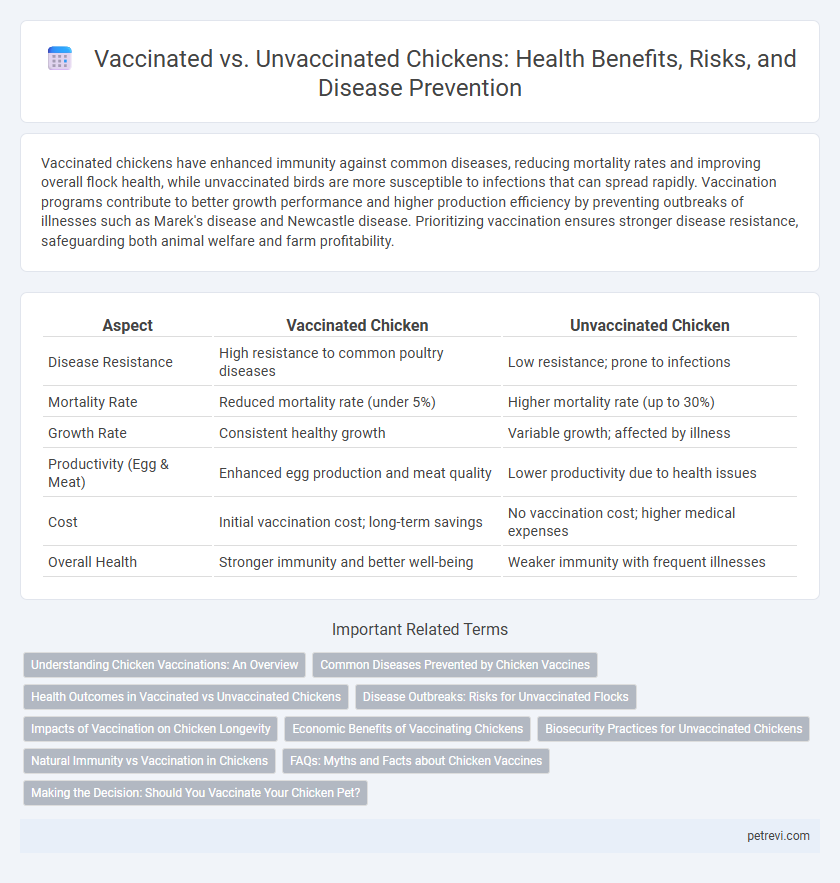Vaccinated chickens have enhanced immunity against common diseases, reducing mortality rates and improving overall flock health, while unvaccinated birds are more susceptible to infections that can spread rapidly. Vaccination programs contribute to better growth performance and higher production efficiency by preventing outbreaks of illnesses such as Marek's disease and Newcastle disease. Prioritizing vaccination ensures stronger disease resistance, safeguarding both animal welfare and farm profitability.
Table of Comparison
| Aspect | Vaccinated Chicken | Unvaccinated Chicken |
|---|---|---|
| Disease Resistance | High resistance to common poultry diseases | Low resistance; prone to infections |
| Mortality Rate | Reduced mortality rate (under 5%) | Higher mortality rate (up to 30%) |
| Growth Rate | Consistent healthy growth | Variable growth; affected by illness |
| Productivity (Egg & Meat) | Enhanced egg production and meat quality | Lower productivity due to health issues |
| Cost | Initial vaccination cost; long-term savings | No vaccination cost; higher medical expenses |
| Overall Health | Stronger immunity and better well-being | Weaker immunity with frequent illnesses |
Understanding Chicken Vaccinations: An Overview
Chicken vaccinations play a critical role in preventing common diseases such as Marek's disease, Newcastle disease, and infectious bronchitis, significantly improving flock health and productivity. Vaccinated chickens exhibit higher immunity, reducing mortality rates and minimizing the spread of infectious pathogens within poultry farms. Unvaccinated chickens remain highly susceptible to outbreaks, posing risks to both animal welfare and economic stability in poultry operations.
Common Diseases Prevented by Chicken Vaccines
Chicken vaccines effectively prevent common diseases such as Marek's disease, Newcastle disease, infectious bronchitis, and fowl pox, significantly reducing mortality rates and improving flock health. Unvaccinated chickens remain vulnerable to severe outbreaks caused by these pathogens, leading to increased illness, decreased productivity, and higher economic losses for poultry farmers. Vaccination programs enhance immune response, ensuring better resistance against bacterial and viral infections that frequently impact commercial and backyard poultry operations.
Health Outcomes in Vaccinated vs Unvaccinated Chickens
Vaccinated chickens demonstrate significantly lower rates of common avian diseases such as Newcastle disease and avian influenza, resulting in improved overall flock health and productivity. Studies indicate vaccinated birds exhibit stronger immune responses, reducing mortality rates by up to 70% compared to unvaccinated counterparts. Unvaccinated chickens face higher vulnerability to infections, often leading to severe outbreaks that compromise growth, egg production, and farm biosecurity.
Disease Outbreaks: Risks for Unvaccinated Flocks
Unvaccinated chicken flocks face significantly higher risks of disease outbreaks, including highly contagious illnesses like Newcastle disease and avian influenza, which can lead to severe mortality rates. Vaccination programs reduce the prevalence of infectious diseases by enhancing immunity, thereby minimizing economic losses and improving overall flock health. Maintaining vaccinated flocks is essential to protecting poultry populations from epidemic outbreaks and ensuring sustainable farm productivity.
Impacts of Vaccination on Chicken Longevity
Vaccinated chickens exhibit significantly improved longevity compared to unvaccinated counterparts due to enhanced immunity against common poultry diseases such as Newcastle disease and avian influenza. Vaccination reduces mortality rates and decreases the prevalence of infections that can cause chronic health issues, leading to healthier, longer-living flocks. Studies indicate that vaccinated chickens can experience a lifespan extension of up to 20%, promoting sustainable poultry production and optimal health management.
Economic Benefits of Vaccinating Chickens
Vaccinating chickens significantly reduces the risk of costly disease outbreaks, leading to lower mortality rates and improved flock productivity. Healthy, vaccinated chickens exhibit better growth rates and feed conversion, enhancing overall farm profitability. Economic benefits also include decreased veterinary expenses and fewer losses from disease-related carcass condemnation.
Biosecurity Practices for Unvaccinated Chickens
Implementing stringent biosecurity practices for unvaccinated chickens is critical to prevent the spread of infectious diseases such as avian influenza and Newcastle disease. Measures include controlled farm access, thorough cleaning and disinfection protocols, quarantine procedures for new or sick birds, and minimizing contact with wild birds and other potential disease vectors. Maintaining a closed flock system and using personal protective equipment significantly reduces pathogen transmission risks, supporting overall poultry health and productivity.
Natural Immunity vs Vaccination in Chickens
Vaccinated chickens develop targeted immunity against specific diseases like Marek's disease and Newcastle disease, resulting in higher survival rates and reduced spread of infections in flocks. Unvaccinated chickens rely on natural immunity, which varies greatly and often leaves them vulnerable to severe outbreaks and mortality. Controlled vaccination programs ensure consistent protection, enhancing overall flock health and productivity compared to reliance on natural immunity alone.
FAQs: Myths and Facts about Chicken Vaccines
Chicken vaccines play a crucial role in preventing diseases such as Marek's disease, Newcastle disease, and infectious bronchitis, significantly reducing mortality rates in flocks. Common myths claim vaccinated chickens become sick from vaccines, but scientifically, vaccines contain weakened or inactive pathogens designed to stimulate immunity without causing illness. Unvaccinated chickens face higher risks of outbreaks, leading to increased morbidity, compromised growth, and potential economic losses for poultry farmers.
Making the Decision: Should You Vaccinate Your Chicken Pet?
Vaccinating chickens significantly reduces the risk of common diseases such as Marek's disease, Newcastle disease, and Infectious Bronchitis, enhancing overall flock immunity and longevity. Unvaccinated chickens remain vulnerable to outbreaks that can lead to high mortality rates, weakened immune systems, and costly medical treatments. Choosing to vaccinate your pet chicken supports proactive health management, ensuring stronger disease resistance and improved welfare.
Vaccinated vs Unvaccinated for Chicken Health Infographic

 petrevi.com
petrevi.com